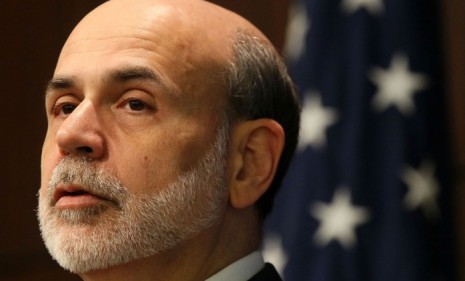Will the Fed's $900 billion cash injection restart the economy?
The Federal Reserve is pumping vast amounts of "new" money into the economy. Will that solve our financial woes?

A free daily email with the biggest news stories of the day – and the best features from TheWeek.com
You are now subscribed
Your newsletter sign-up was successful
As many predicted, the Federal Reserve has agreed on another round of quantitative easing — essentially printing "new" money — in a bid to jump start the economy (read more on quantitative easing from The Week). The Fed announced yesterday it would buy up $600 billion of long-term government bonds, or Treasuries, by the middle of 2011 in hopes of driving down rates on mortgages and other debt and spurring investment. That comes on top of an expected $300 billion in buying from earlier programs. Will this massive cash injection be enough to revitalize the economy? (Watch a CNBC discussion about the announcement)
The evidence suggests it won't help much: The Fed surprised everyone by pumping $1 trillion into the economy in March last year, notes Rick Newman at U.S. News & World Report, and while it steadied the stock market, it didn't speed up GDP growth. This round "will probably have far less impact" — mainly because the market was expecting it for months and has already priced it into expectations.
"Why the Fed's quantitative easing is overblown this time"
The Week
Escape your echo chamber. Get the facts behind the news, plus analysis from multiple perspectives.

Sign up for The Week's Free Newsletters
From our morning news briefing to a weekly Good News Newsletter, get the best of The Week delivered directly to your inbox.
From our morning news briefing to a weekly Good News Newsletter, get the best of The Week delivered directly to your inbox.
$600 billion a lot of money — but still too little: Call this quantitive easing "lite," says John Kemp at Reuters. "After all the thunderous commentary" for and against pumping more cash into the economy, the Fed has "labored mightily and brought forth a mouse." Only "shock and awe" could have jolted the market into action. This may "shave more than a few basis points" off interest rates, but the overall effects "will probably be marginal."
It's already worked: "I'm struck by the extent of the scepticism regarding this action," says The Economist. Sure, the "impact of easing" had already hit the markets. But "that impact is impressive." Equity markets are up and the dollar is down — which will help "domestic firms thinking about hiring and investing." It may not solve our unemployment rate, but "it's not clear that any Fed action" could do that.
A free daily email with the biggest news stories of the day – and the best features from TheWeek.com
-
 The problem with diagnosing profound autism
The problem with diagnosing profound autismThe Explainer Experts are reconsidering the idea of autism as a spectrum, which could impact diagnoses and policy making for the condition
-
 What are the best investments for beginners?
What are the best investments for beginners?The Explainer Stocks and ETFs and bonds, oh my
-
 What to know before filing your own taxes for the first time
What to know before filing your own taxes for the first timethe explainer Tackle this financial milestone with confidence